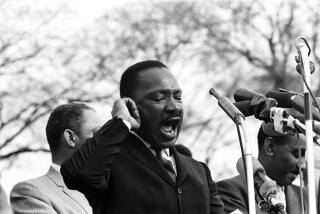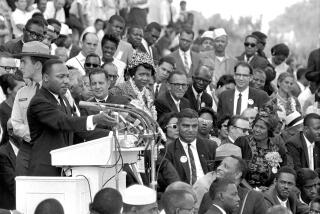Bishop Tutu and Dr. King : Can Nonviolence Achieve Justice in South Africa?
- Share via
As an undergraduate in the mid-1960s I listened to Dr. Martin Luther King Jr. speak to a packed auditorium of students at the University of Southern California. Today I will have the privilege of introducing on the same campus his spiritual successor, Bishop Desmond M. Tutu.
This opportunity has set me to thinking about these two men, about the parallels in their struggle and the differences.
In his relatively brief public life King changed many, many lives, mine among them. I was majoring in psychology at the time, interested in issues of personal adjustment and fulfillment. King’s influence not only refocused my attention from the individual to the societal level but also awakened in me a new awareness of the power of religion to change political structures. A year later I enrolled in a graduate program in religion.
King, the man, is dead, a martyr to his cause. But the cause lives. Gratefully, we have a national holiday that--from Jan. 20, 1986, forward--will remind us and our children of both the man and his dream.
Now, from the ranks of the ministry, another black prophet has emerged, exerting moral leadership, another Nobel Peace Prize winner--Bishop Tutu.
The moral issue remains the same: the oppression of people of one color by those of another. The message also is the same: Nonviolence is the best way to achieve a redeemed social order. Only the political context is different.
King could appeal to a constitution that guaranteed him, and all black people in America, equality and justice before the law. Tutu lives under a constitution that explicitly reserves or denies rights and privileges by race. For South Africa the tactics of nonviolent change must be different, at least in part.
Restricted by law at home, Tutu has been forced to move beyond his own national context--even beyond his own nation’s borders--in order to appeal to the international community’s perception of moral decency.
Tutu is convinced that justice will come to South Africa. This conviction is rooted deep in his religious vision. But the question confronting black Africans, as well as President Pieter W. Botha and other Afrikaners, is: Peace at what cost?
At home, Tutu is struggling with the same militant spirit that King faced when Black Power advocates said, “We’ve waited long enough!” King never wavered in his pacifism. Tutu claims not to be a pacifist. His moral vision is informed by the enduring “just war” tradition that dates back to Augustine in the 4th Century of the Christian tradition. Although the bishop has been a moderating voice in the midst of rising tensions during the last decade, on more than one occasion recently he has implied that the day may come when violence may be justified in opposing an intractable government.
Increasingly the reform movement in South Africa is being led by extremely courageous and committed young blacks, many of whom have come to view Christ as liberator rather than comforter, and who take the story of the Exodus as paradigmatic for their own rescue from slavery. These individuals do not, however, have the same name recognition in the world press as does the older generation of reformers represented by Tutu. Increasingly the political situation puts Tutu in the important new role of interpreting the actions of his fellow countrymen to the larger world community--that is, explaining their resort to violence. His role as a principal actor himself in the struggle for liberation will depend on how persuasive he can be in convincing those at home to give the strategy of nonviolence another chance.
If violence by blacks increases, we should not be too quick to echo Botha’s admonition that reforms must occur slowly. To do so would be to ignore the violence that is done to blacks daily by the system of apartheid.
Tutu’s unique role in the South African struggle depends on his ability to maintain credibility among the many factions that are involved in the liberation struggle. As he plays this mediating role between those inside and those outside his country, let us remember that there is a difference between explaining the causes of violence and being an advocate of violence.
Tutu has made his position clear: The only path to avoiding further violence in South Africa is if morally concerned people elsewhere pressure corporations, banks and their own government leaders to join hands in declaring that civilized countries do not measure personal worth and public access by the color of one’s skin.
Martin Luther King Jr. taught us how to fight for that principle without violence. Now Desmond M. Tutu is among us with the urgent request that we do so abroad.
More to Read
Sign up for Essential California
The most important California stories and recommendations in your inbox every morning.
You may occasionally receive promotional content from the Los Angeles Times.













